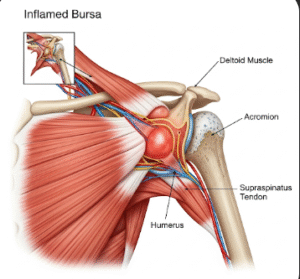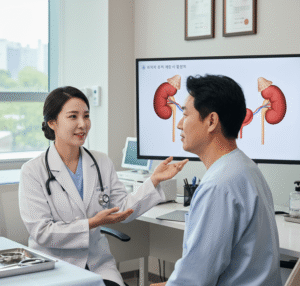➤ Overview
Throwing up, medically referred to as vomiting or emesis, is the forceful expulsion of stomach contents through the mouth. It is a common symptom that can occur in response to various conditions, ranging from mild food-related issues to serious systemic or gastrointestinal disorders.
In South Korea, vomiting is evaluated by general practitioners, gastroenterologists, pediatricians, or emergency specialists, depending on severity. Diagnostic testing may include physical examination, blood tests, imaging, or endoscopy to identify the underlying cause. Prompt recognition and treatment are essential to prevent dehydration, electrolyte imbalance, and complications.
➤ Key Facts
→ Vomiting can be acute or chronic, depending on the underlying cause.
→ It may result from infection, food poisoning, motion sickness, medications, or neurological disorders.
→ Persistent or severe vomiting can lead to dehydration, electrolyte imbalance, and malnutrition.
→ In Korea, hospitalization and intravenous fluids are available for severe cases.
→ Vomiting is often accompanied by nausea, abdominal pain, or dizziness.
→ Treatment focuses on hydration, symptom relief, and addressing underlying causes.
→ Awareness of red flags is critical for early medical intervention and prevention of complications.
➤ What is Throwing Up (Vomiting)?
Vomiting is the body’s reflex to expel harmful substances or respond to physiological stress:
→ Reflex mechanism – Controlled by the vomiting center in the brainstem, triggered by signals from the gut, inner ear, or higher brain centers.
→ Acute vs chronic vomiting – Acute vomiting is often self-limiting, while chronic vomiting may indicate gastrointestinal or metabolic disorders.
→ Functional impact – Can interfere with daily activities, nutrition, and hydration.
→ Associated protective mechanism – Helps eliminate toxins, bacteria, or irritants from the stomach.
→ Variations – Projectile vomiting, bilious vomiting (green), or blood-stained vomiting (hematemesis) can indicate specific underlying conditions.
➤ What Symptoms are Related to Vomiting?
Vomiting rarely occurs in isolation and may be accompanied by other symptoms:
→ Nausea → Sensation of queasiness often preceding vomiting.
→ Abdominal pain or cramping → Frequently associated with gastrointestinal causes.
→ Diarrhea → Common with infections or food poisoning.
→ Fever → May indicate infection or systemic inflammation.
→ Dizziness or fainting → Result of fluid loss or electrolyte imbalance.
→ Loss of appetite → Occurs alongside persistent vomiting.
→ Sweating or pallor → Autonomic response to vomiting.
→ Headache → Can accompany dehydration or infection-related vomiting.
→ Projectile or bloody vomit → Urgent red flag requiring immediate medical evaluation.
➤ What Causes / Possible Causes?
Vomiting can result from gastrointestinal, systemic, neurological, or external factors:
→ Gastrointestinal infections – Viral gastroenteritis, food poisoning, bacterial infections.
→ Medications and toxins – Chemotherapy, antibiotics, alcohol, or drugs.
→ Motion sickness or travel sickness – Inner ear disturbances triggering nausea and vomiting.
→ Metabolic or endocrine disorders – Diabetes (DKA), adrenal insufficiency, or electrolyte imbalance.
→ Neurological conditions – Migraine, increased intracranial pressure, or brain injury.
→ Pregnancy – Morning sickness during early pregnancy.
→ Gastrointestinal obstruction – Blockages, hernia, or pyloric stenosis in infants.
→ Psychological factors – Anxiety, stress, or eating disorders.
→ Chronic systemic diseases – Liver disease, kidney failure, or cancer.
➤ When Should I See My Doctor?
Seek medical attention if vomiting is:
→ Persistent for more than 24–48 hours → Especially in children or elderly.
→ Associated with severe dehydration → Dry mouth, reduced urine, dizziness, or weakness.
→ Contains blood or resembles coffee grounds → Indicates gastrointestinal bleeding.
→ Accompanied by severe abdominal pain or distension → Suggests obstruction or serious GI disease.
→ Linked with high fever, confusion, or neurological symptoms → Possible systemic or neurological disorder.
→ In infants, young children, or pregnant women → Requires urgent evaluation.
→ In Korea, hospitals and clinics provide rapid assessment, IV hydration, and diagnostic testing for severe vomiting.
➤ Care and Treatment
Management depends on cause, severity, and patient age:
→ Hydration and electrolyte replacement → Oral rehydration solutions or IV fluids for severe cases.
→ Dietary adjustments → Gradual reintroduction of bland foods after vomiting subsides.
→ Medications → Anti-emetics like ondansetron, metoclopramide, or dimenhydrinate for symptom relief.
→ Treat underlying cause – Antibiotics for bacterial infections, antacids for gastritis, or anti-migraine therapy.
→ Lifestyle modifications → Avoid motion triggers, alcohol, irritant foods, and manage stress.
→ Monitoring and rest → Adequate sleep and gentle activity help recovery.
→ Hospital care – For severe dehydration, persistent vomiting, or systemic complications.
➤ Treatment Options in Korea
South Korea offers comprehensive care for vomiting, including diagnostic, medical, and supportive interventions:
Diagnosis in Korea
→ Medical history and physical examination – Identify triggers, duration, and associated symptoms.
→ Blood tests and metabolic panels – Evaluate electrolytes, liver, and kidney function.
→ Imaging studies – Ultrasound, X-ray, or CT scan for suspected obstruction or organ disease.
→ Endoscopy – For gastrointestinal bleeding or persistent vomiting.
Medical Treatments in Korea
→ Anti-emetics – Ondansetron, metoclopramide, or prochlorperazine for symptom relief.
→ IV fluids and electrolyte replacement – Critical for severe dehydration.
→ Targeted therapy – Antibiotics, acid suppression, or migraine management depending on cause.
→ Nutritional counseling – Reintroducing food safely after prolonged vomiting.
Advanced Therapies in Korea
→ Hospitalization for severe or complicated cases – Monitoring and supportive care.
→ Neurological evaluation – For persistent vomiting linked to migraines or intracranial pathology.
→ Multidisciplinary care – Gastroenterologists, pediatricians, neurologists, and dietitians collaborate for comprehensive treatment.
Rehabilitation & Support in Korea
→ Follow-up to monitor recurrence, hydration status, and nutritional intake.
→ Education on preventive strategies, lifestyle changes, and symptom management.
→ Support for children, pregnant women, or elderly patients who are more vulnerable to complications.













